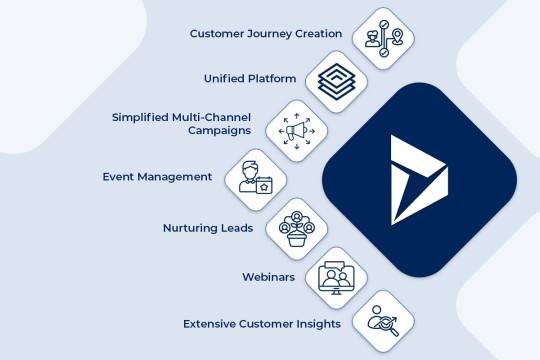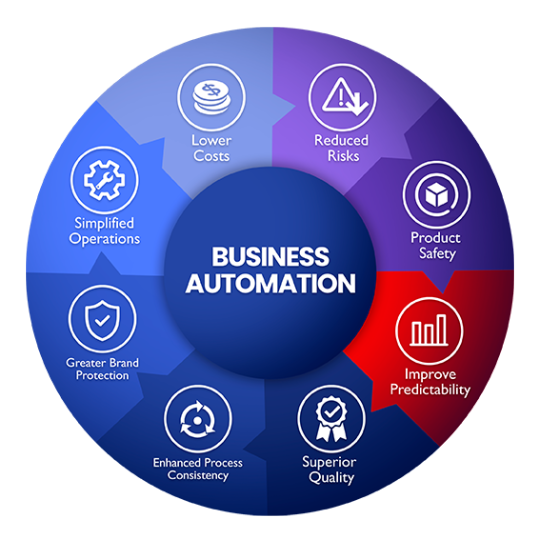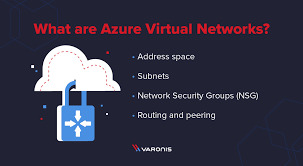Don't wanna be here? Send us removal request.
Text
Advantages of Dynamic 365 Marketing
Dynamics 365 Marketing stands as a robust customer engagement platform developed by Microsoft, meticulously crafted to assist enterprises in refining their marketing endeavours and bolstering their customer connections. Nestled within the expansive Dynamics 365 suite of business applications, it addresses multifaceted realms of customer engagement, sales, service, and operational domains. Advantages of Dynamic 365 Marketing.
Dynamics 365 Marketing documentation
Dynamics 365 Marketing serves as a customer relationship management (CRM) and marketing automation solution provided by Microsoft. Its purpose is to assist enterprises in overseeing marketing campaigns, engaging with customers, and fostering lead generation activities. Typically, the comprehensive documentation for Dynamics 365 Marketing is accessible through the official Microsoft documentation website. Nonetheless, it's important to be aware that updates or modifications might have occurred since the time of my last knowledge update.

Dynamics 365 Marketing license
Microsoft's Dynamics 365 Marketing provides marketing automation solutions aiding campaign management, customer interactions, and lead generation. Licensing choices encompass plans, standalone, and user-centric models, often under a subscription framework. For up-to-date specifics, consult the official Microsoft site or reach out to their representatives.
Dynamics 365 Marketing features
The array of Dynamics 365 Marketing features encompasses email marketing, orchestrating customer journeys, managing events, lead scoring, segmentation, analytics, social media integration, and additional capabilities. It empowers enterprises to craft personalized campaigns, foster customer engagement, nurture leads, and assess performance. For an exhaustive list and in-depth insights, consult the official Dynamics 365 Marketing documentation or get in touch with Microsoft representatives.
Microsoft Dynamics 365 Marketing functions as a customer relationship management (CRM) software with a range of features geared toward amplifying marketing endeavors for businesses. While updates or alterations may have occurred since then, here are some merits of Dynamics 365 Marketing as of that juncture:
Holistic Integration: Dynamics 365 Marketing is part and parcel of the comprehensive Dynamics 365 suite, thereby harmonizing with other Microsoft applications like Dynamics 365 Sales and Customer Service. This cohesion facilitates an all-encompassing perspective of customer engagements and data along the entire customer journey.
360-Degree Customer Insight: The platform collates and consolidates data from disparate sources, thereby yielding a comprehensive view of customer inclinations, behavior, and interactions. This empowers marketers to devise tailored and personalized campaigns.
Segmentation and Customization: With its robust segmentation prowess, Dynamics 365 Marketing empowers marketers to generate finely-tuned audience segments hinged on diverse attributes and behaviors. This fosters the creation of bespoke marketing campaigns that resonate with specific customer groups.
Multi-channel Campaign Governance: The platform effectively manages multi-channel marketing encompassing mediums such as email, social media, web, SMS, events, and more. Marketers can meticulously strategize, execute, and monitor campaigns across diverse channels from a singular interface.
Automated Processes and Workflows: Dynamics 365 Marketing facilitates the automation of marketing workflows and processes. This encompasses lead nurturing, follow-ups, and automated communications predicated on particular customer actions or events, thereby saving time and ensuring prompt responses.
Lead Oversight: The platform proffers lead scoring and qualification capacities, enabling sales and marketing teams to rank leads based on their probability of conversion. This streamlines the handover procedure between marketing and sales departments.
Event Supervision: Dynamics 365 Marketing furnishes tools for orchestrating, publicizing, and managing events, spanning virtual webinars to physical conferences. The platform aids in registration, tracking attendees, and post-event follow-ups.
Analytics and Reporting: Equipped with built-in analytics and reporting traits, the platform empowers marketers to trace campaign performance, gauge key performance indicators (KPIs), and garner insights to refine future initiatives.
A/B Experimentation: The platform accommodates A/B testing, permitting marketers to assess diverse iterations of campaigns to identify the most resonant option for their target audience.
Scalability: Dynamics 365 Marketing caters to the exigencies of both small-scale enterprises and larger corporations. It can scale in tandem with the expansion of marketing operations.
Regulatory Compliance and Security: Microsoft allocates resources toward security and compliance measures, safeguarding customer data and ensuring alignment with pertinent regulations.
Remember that the efficacy of any software solution hinges on your precise business requisites and the extent to which the platform aligns with your objectives and strategies. Before reaching a verdict, it's prudent to assess the most recent information, deliberate over your organization's needs, and potentially seek counsel from professionals well-versed in the latest Dynamics 365 Marketing capabilities.
0 notes
Text
14 Key Benefits of Business Process Automation
Process automation offers numerous benefits that can significantly impact businesses and organizations. Some of the key benefits of process automation include:
Increased Efficiency: Automation reduces the need for manual intervention in repetitive tasks, leading to faster and more streamlined processes. This allows employees to focus on more strategic and value-added activities, improving overall productivity.
Cost Savings: Automated processes can lead to significant cost savings by reducing labor costs, minimizing errors, and optimizing resource allocation. It reduces the need for human resources to perform repetitive tasks.
Improved Accuracy and Quality: Automation minimizes the chances of human errors, ensuring a higher level of accuracy and consistency in operations. This results in improved overall quality of products and services.

Consistency and Standardization: Automation ensures that processes are executed consistently according to predefined rules and standards. This standardization leads to uniform outcomes and better customer experiences.
Faster Process Execution: Automated processes can operate 24/7 without breaks, resulting in faster task execution and quicker response times to customer needs and market changes.
Enhanced Compliance: Process automation helps businesses adhere to industry regulations and internal policies by enforcing standardized procedures and generating accurate documentation.
Scalability and Flexibility: Automated processes can easily handle an increased workload without the need for significant adjustments, making them scalable and adaptable to changing business needs.
Improved Data Management and Insights: Automation generates data and analytics that provide valuable insights into process performance. Making data-driven decisions and locating bottlenecks can both benefit from these insights.
Enhanced Customer Experience: Automation can lead to faster response times and improved customer service. Features like automated emails, chatbots, and self-service portals can provide immediate support to customers.
Streamlined Collaboration: Automation facilitates better collaboration between different departments and teams by automating workflows and ensuring seamless information flow.
Business Agility: Automation enables businesses to respond quickly to market changes and opportunities, allowing for faster adaptation and decision-making.
Time Savings: Automated processes can save considerable time, allowing organizations to complete tasks and deliver products or services more quickly to customers.
Competitive Advantage: Embracing process automation can give a company a competitive edge by enabling faster, more efficient, and cost-effective operations, leading to better customer satisfaction and retention.
Employee Satisfaction: By automating repetitive and mundane tasks, employees can focus on more challenging and creative work, leading to higher job satisfaction and engagement.
Overall, process automation can transform how businesses operate by optimizing workflows, increasing productivity, and enhancing overall performance. However, it's crucial to carefully plan and implement process automation to ensure it aligns with the organization's goals and processes. Additionally, continuous monitoring and improvements are essential to maintaining the effectiveness of automated processes over time.
#process automation#ai automation#what is automation#Cambay#Robotic Process Automation#Business Process Automation#Benefits of process automation
0 notes
Text
What You Need to Know About Microsoft Azure Networks
Microsoft Azure Networks
A network in the cloud is isolated and represented logically by Azure Networks. We refer to these networks as "virtual networks" (VNet) because virtualization is a key component of Azure's core services. These VNets can connect with other VNets on Azure, connect the Azure VNets to the on-premises environment, construct and administer virtual private networks (VPNs) on Azure, and much more.

It is possible to connect the on-premises networks to Azure VNets because each VNet has its own CIDR blocks.
Different Azure resources, such as virtual machines and web apps, may securely connect with one another and with other devices on the internet and on-premises thanks to virtual Azure Networks.
Networking Azure Components
Similar elements found in on-premises network infrastructure can be found in Azure Networks as well. The primary elements of Azure Networks include the following.

Subnets
For security purposes in various organizational divisions, subnets are a range of IP addresses within a network divided into several subnets.
2. IP Addresses.
There are two kinds of IP addresses that can be issued to Azure resources:
(a) Public
For contact with Azure's general public, a public IP address is assigned. When the service is stopped, the IP address is released and a new one is allocated to the Azure resource, which by default has a dynamic IP address. When a static IP is given to an Azure resource, it remains in place until the resource is deleted.
(b) Private
Private IP addresses can connect through an express route, a VPN gateway, or when the Azure resource is located on a different VNet.
Options for Azure Networking Services
To make your Azure environment fully-fledged and able to handle all the traffic that pulls into it, Azure offers a selection of Microsoft Azure services and additional networking features from third-party vendors.
Network Security Groups (NSG) for Azure
The main tool for managing and enforcing network traffic policies at the networking level is the Network Security Group. Access between workloads is either permitted or denied with NSGs. The company can also impose restrictions on who can use the resources in a virtual network.
Balancing loads
According to resource availability and rule assignment, a load balancer distributes newly arriving inbound flows to the backend pool instances. Business applications can be scaled with Azure load balancing, resulting in high availability for services. In addition, they offer extremely high throughput and low latency, and depending on the TCP and UDP application traffic, they can scale up to millions of flows.

There are two SKUs for Azure load balancers: basic and standard, which vary in features and scalability. These load balancers frequently offer many options, according to category:
Similar to the AWS service Route53, Azure Traffic Manager uses DNS to route traffic to the appropriate locations. In terms of destination selection, there are three options: failover, performance, and round-robin.
L7 load balancing is carried out via the Azure Application Gateway, which also supports HTTP requests, SSL termination, and cookie resolution.
Routing Desks
When it's necessary to modify the traffic's routing, Azure Routing Tables come in handy because they can replace the automatically provisioned Azure route systems. These routing adjustments are made to outgoing traffic from a subnet and can direct it to a virtual machine, virtual network, or virtual network gateway as its next hop.
VPNs, or virtual private networks
By prohibiting any unauthorized individuals from listening in on the traffic, a VPN ensures that any sensitive data transmitted over the network is protected. A VPN is an encrypted, secure connection over the internet from a device to a separate network. As more offices provide options for working from home, VPNs are the preferred option.
When there is a requirement to transport data between many VNets, Azure's VPN options come in handy. Azure provides two different gateway types.
VPN
Azure VPNs come in two flavours: route-based and policy-based.
On a route-based VPN, the data packets are encrypted and decrypted as they travel via a tunnel interface. A policy-based VPN encrypts and decrypts communication in accordance with the applicable policies.
Quick Route
The on-premises data centre and the Azure data centre are connected directly through Express Route. An express route uses a connectivity provider to provide the connection rather than the general internet. In comparison to the open internet, an ExpressRoute connection delivers a more dependable connection with quicker speeds and reduced latencies. When data is sent between the on-premises environment and the Azure data centre, ExpressRoute also enjoys significant cost reductions.
Azure has three connectivity options as of the time this article was written. In simpler terms, IPSec VPN over the open internet is the most fundamental. The other two choices are offered by ExpressRoute.
Switch Provider
Here, an exchange provider with a direct connection to Azure helps Azure establish a connection via point-to-point. Although using this option gives complete control over routing, the requirement for point-to-point connections makes it unsuitable for multipoint WANs.
Service provider for networks
The network service provider offers a direct link to Azure using the ExpressRoute option. Each site or department employs several points of connectivity, despite the fact that the network service provider oversees routing.
Any organization can benefit from the additional Azure features offered by ExpressRoute. ASR, or Azure Site Recovery, is one. Since this ExpressRoute connection is a sensitive one on Azure, you can replicate data without worrying about bandwidth availability.
Network Watcher for Azure
Access information is provided by the Network Watcher, including logging, monitoring, diagnostic tools, and automation. For greater visibility, you may keep a close eye on the network's performance and health.
Azure Networks: What They're Worth
If your company chooses to use Azure, its networking solutions address all important aspects of cloud networking.
Distancing and increasing security
Azure Networks may segregate virtual machines and applications, enhancing the security of the resource environment, by defining subnets, assigning private IP addresses, and more.
Topologies of networks
Virtual networks eliminate the need to be concerned about messy cabling. You have the exceptional ability to create complex network topologies in order to execute virtual appliances on the network. Additionally, it gives you more freedom to design your system with tools like WAN optimizers, application firewalls, and load balancers.
Additional Datacenters
Azure Cloud can supply the workloads and simply have them communicate with the on-premises datacenter using the robust Azure networking solutions when you need to expand the on-premises data center but the expense of growth is prohibitive. As a result, there is little to no capital expense and no need for new gear.
Deploying Hybrid Applications
A backend SQL Server database is frequently required for business applications to operate. Businesses that host their SQL databases on-premises have a significant obstacle that prevents them from making efficient use of cloud computing resources. However, you can create hybrid cloud apps and securely link them with on-premises SQL databases by leveraging virtual networks.
Alternative Solutions
Any problem you may have can always be solved thanks to Azure's extensive marketplace. There are numerous networking solutions for load balancers, firewalls, traffic management, and other network devices available from networking companies.
Global Availability of Azure
Business data and apps can be hosted in a local Azure data center thanks to the platform's global availability. Data access is quicker and has lower latencies. None of the top cloud rivals currently possess this capability. As of the time this article was written, Azure was accessible in 52 regions and was actively growing to include more locations and data centers.
1 note
·
View note